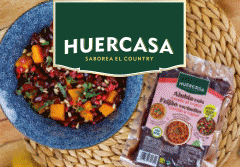Koppert’s biological fungicide is very efficient in all types of soils and is authorised for ecological crops
The experience in the fields has shown the benefits of applying Trianum to seedlings to inoculate natural defences in the plant before the crop reaches the greenhouse. Trianum, Koppert’s biological fungicide, increases the precocity and strength of the plant and improves the development of the root system.
Applying it in the seed beds, before transplanting on the farms, maximum protection against fungi pathogens in the soil is guaranteed in a completely natural way, and without any waste. Subsequently, it may be applied on the farm to the entire crop. Therefore, the plant obtains the natural defences it needs and improves the absorption of nutrients and water.
An increasing number of producers and seedling growers have seen that Trianum works in practice as a protecting shield against pathogens and it prevents fungal root diseases such as Fusarium, Sclerotinia, Rhizoctonia, Phytium and nematodes.
For all soil types
Trianum’s secret lies in the T-22 strain of the beneficial fungus Trichoderma harzianum, patented by Koppert. The exclusive T-22 is very efficient in all soil types. As opposed to other commercial strains, Trianum has the widest temperature range in soil and it remains active between 8 and 30 degrees. This interval is when its spores germinate and it deploys all of its protecting action.
One of the characteristics that best define this strain is that its natural aggressiveness means that it colonises the plant’s root system in a record time, protecting the roots and destroying the pathogens, while at the same time, the strain is expanding, increasing and extending the benefits over time. Trianum offers a high compatibility with most plant protection products that are regularly used in farming and it allows in-tank mixing.
In addition, it reduces treatments both to seedlings and to crops, it has no safety period and it can be used in conventional farming, integrated production and on ecological crops. All of this is translated into important savings for the producers. For further information: www.trianum.es.





















